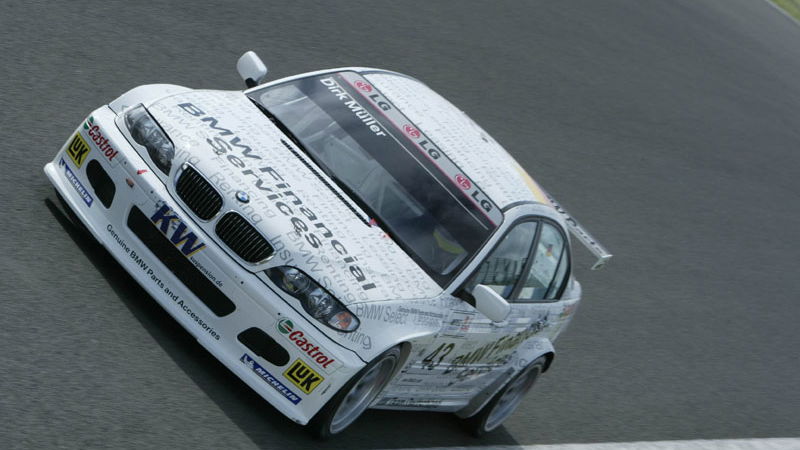BMW in motorsport - a potted history.
Generating innovative technology for sporting contests and record attempts has always been part of BMW's identity.
After world records and championship titles with aero-engines and motorcycles, a one-two win in the 1940 Mille Miglia marked one of the first international touring car successes with the BMW 328. In post-war Germany, motorcycling ace Schorsch Meier became a national hero on BMW's flat-twin Boxers.

Generating innovative technology for sporting contests and record attempts has always been part of BMW's identity.
After world records and championship titles with aero-engines and motorcycles, a one-two win in the 1940 Mille Miglia marked one of the first international touring car successes with the BMW 328. In post-war Germany, motorcycling ace Schorsch Meier became a national hero on BMW's flat-twin Boxers.
Since 1966, BMW has earned 24 FIA-approved titles in touring car racing alone - both European Championship and World Championship titles. The national titles
accumulated by BMW drivers are numberless. The winning cars: BMW 1800Ti, 2002Ti, 2002, 3.0 CSL, 320, 635CSi, 528i, M3 and 320i. Up to and including 1992,
BMW M3 drivers secured more than 1,500 individual wins and 50 titles. From 1993 to 1998, 29 championship titles were won around the globe with the BMW 320i.
In 2001, the FIA once again sanctioned a European title for touring car racing, which was promptly claimed by the BMW 320i. In 2003, BMW won the manufacturers' title
in the FIA European Touring Car Championship (ETCC) and successfully defended it in 2004 as well as winning the drivers' title. In 2005, BMW is competing in the FIA
Touring Car World Championship (FIA WTCC) with the 320i.
With a total of 18 overall wins, BMW is by far the most successful manufacturer in the 24-hour races on the N?rburgring. Beyond that, BMW has won the 24 Hours of Spa
21 times. In 1999 it claimed overall victory in the Le Mans 24 Hours with the BMW V12 LMR.
Building on ten years' experience of junior talent promotion, BMW Motorsport took an ultra-modern vehicle to the grid for the 2002 season - the Formula BMW. In conjunction with a unique Education and Coaching Programme, the Formula BMW championships in Asia, Britain, Germany and North America have established
themselves as the international benchmark.
In Formula Two, a BMW four-cylinder engine was the yardstick during the period from 1973 to 1982, taking six drivers to a European Championship title. In 1980, BMW
announced its first Formula One involvement. Paul Rosche took a production four-cylinder engine block and turned it into a 16-valve turbo unit reduced to 1.5 litres, which by the end of its career had an output of around 1,400 bhp.
On 23 January 1982, Nelson Piquet lined up on the grid at Kyalami, South Africa, in a Brabham-BMW and, in June, the Brazilian took his first GP victory in Montreal. In 1983, he became world champion. The ninth and final BMW turbo victory was claimed in Mexico in 1986 by Gerhard Berger in a Benetton-BMW. At the end of 1987, BMW halted its F1 engine production. New regulations had come into force and the era of sheer turbo power was over.
In 1997, BMW announced it would return to Formula One in 2000 - with a three-litre normally aspirated V10 engine and with WilliamsF1 as its partner. It turned out a
textbook comeback: third in the World Championship in the debut season, second in 2002, and a title contender right up to the final in 2003. 2004 proved a lean year,
with no victory forthcoming until the final race.
The BMW Formula One engines were designed and built in Munich from the outset and, including BMW's own engine management system and foundry, and in close
alliance with the BMW Research and Innovation Centre. BMW's Formula One division currently employs 300 staff. BMW Motorsport has a workforce of 350.
Sauber and BMW have been partners before their 2005 deal, with Peter Sauber running the German engines early in his career as team owner.
He founded PP Sauber AG, later renamed Sauber Motorsport AG, in Hinwil in 1970 and, in the early years, the qualified electrical fitter built competition sportscars for entry in the national car championship. The Swiss racing team first attracted international attention in 1976 when Herbert M?ller gained overall victory in the European Interseries driving a Sauber BMW C5.
In the mid-1980s, Sauber became the Mercedes-Benz works team for the World Sports Car Championship. The climax of this partnership was a one-two win in Le Mans in 1989 and two successive titles in the World Sports Car Championship in 1989 and 1990.
In 1993, Sauber moved up to Formula One and managed to gain two world championship points in its very first race, the South African GP in Kyalami. Sauber Petronas then emerged as one of the most successful private teams of recent years, claiming a total of six podium places. In 2001, the Swiss team came fourth in the constructors' championship and appeared to be on for a similarly notable result in 2004, until the McLaren powerhouse got its act together and eventually claimed fifth spot.